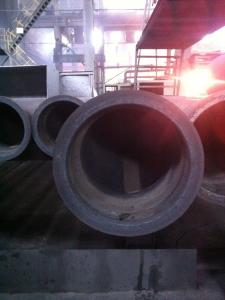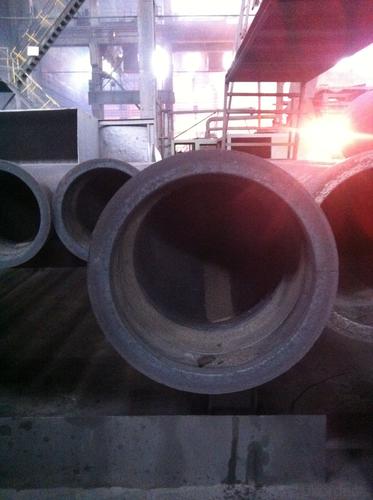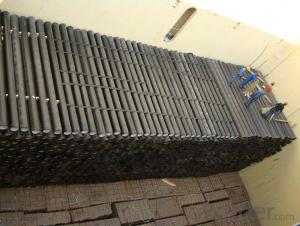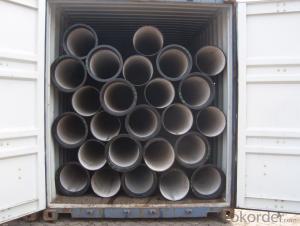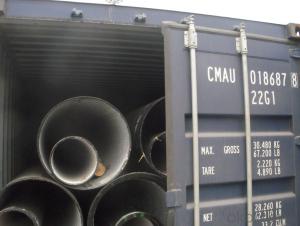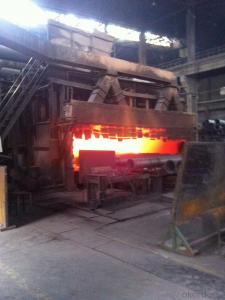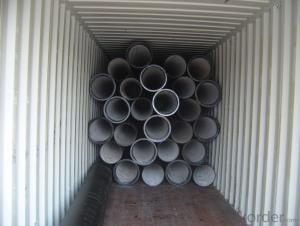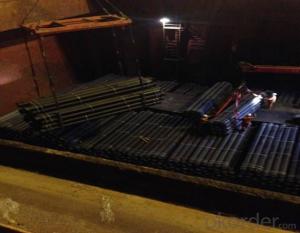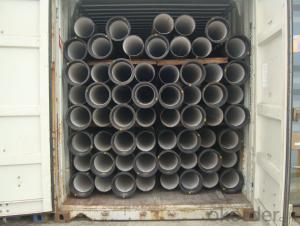DUCTILE IRON PIPE AND PIPE FITTINGS K8 CLASS DN1200
- Loading Port:
- Tianjin
- Payment Terms:
- TT OR LC
- Min Order Qty:
- 23 pc
- Supply Capability:
- 3000 pc/month
OKorder Service Pledge
OKorder Financial Service
You Might Also Like
· Material : Ductile Cast Iron
· Size Range : DN 80mm to DN 2000mm
· Unit Effective Length : 6m or 5.7m
· Manufacture Standard: ISO 2531:1998/ EN 545:2006/EN 598:2007
· Annual capacity : 200,000 tons
· Coating Exterior: Zinc 130g/m2 according to ISO 8179-1 and bitumen coating 70 microns.
· Cement Interior: Portland Cement/ High Alumina Cement/ Sulphate Resisting Cement Lining according to ISO 4179
· Special requirements on external coating and internal lining can be applied
· We also provide accessories such as SBR/EPDM rubber gaskets, lubricant paste, pipe caps, PE sleeves, etc.
Additional Parts:
Each pipe is strictly inspected according to related standard to ensure permanently high performance.
Easy Installation at site and service free for life
Long Service Lifespan
Quotation will arrive you within 24hours once we get your inquiry.
We guarantee offering you a competitive price.
A copy of original inspection reports of pipes will be offered after shipment.
Photos of loading process will be sent to the customer after shipment effect.
We will follow-up the delivery progress after shipment effect and update to the customer on weekly basis.
- Q: How does ductile iron pipe perform in high-temperature environments?
- Ductile iron pipe performs exceptionally well in high-temperature environments due to its unique properties and characteristics. The material is known for its high strength, toughness, and durability, making it suitable for various applications including those involving elevated temperatures. One of the key advantages of ductile iron pipe in high-temperature environments is its ability to withstand thermal expansion and contraction. The material has a low coefficient of thermal expansion, which means it can handle significant temperature fluctuations without experiencing detrimental effects. This property ensures that the pipe remains structurally stable and does not deform or crack when exposed to high temperatures. Additionally, ductile iron pipe has excellent thermal conductivity. This property allows the pipe to efficiently transfer heat, preventing the build-up of excessive heat and reducing the risk of thermal stress. The high thermal conductivity of ductile iron also enables it to dissipate heat quickly, ensuring that the pipe remains within safe operating temperatures. Furthermore, ductile iron pipe has a high melting point, typically around 2200°F (1200°C). This characteristic ensures that the pipe retains its structural integrity even in extremely high-temperature environments. It can effectively handle hot fluids, steam, and other high-temperature substances without compromising its performance. Another crucial aspect is the corrosion resistance of ductile iron pipe. It is commonly coated with protective linings, such as cement mortar or epoxy, which provide an additional layer of defense against corrosion caused by high temperatures. These linings act as a barrier, preventing the pipe from coming into direct contact with corrosive substances and maintaining its longevity in high-temperature environments. In summary, ductile iron pipe is an excellent choice for high-temperature environments due to its exceptional strength, thermal stability, thermal conductivity, and corrosion resistance. Its ability to withstand thermal expansion, its high melting point, and its efficient heat transfer properties make it a reliable and durable option for various applications in such conditions.
- Q: Can ductile iron pipes be used in nuclear power plants?
- Yes, ductile iron pipes can be used in certain applications within nuclear power plants. However, their use is limited to non-safety-related systems where they are not exposed to radioactive environments or high-pressure conditions. Safety-related systems within nuclear power plants typically require materials with higher resistance to radiation and pressure, such as stainless steel or other specialized alloys.
- Q: Can ductile iron pipe be used for high-pressure gas systems?
- Ductile iron pipe is a viable option for high-pressure gas systems due to its remarkable strength and durability. Its ability to withstand high pressures makes it suitable for applications requiring such systems. It possesses outstanding mechanical properties, including high tensile strength, yield strength, and impact resistance. These properties enable it to endure the pressures associated with gas transmission. Additionally, its resistance to corrosion ensures its reliability for long-term use in high-pressure gas systems. However, to ensure optimal safety and performance, it is crucial to consider the specific requirements and regulations of the gas system and seek guidance from industry professionals for correct installation and maintenance of the ductile iron pipe.
- Q: What is the expected fire resistance of ductile iron pipes?
- The expected fire resistance of ductile iron pipes can vary depending on several factors such as the thickness of the pipe walls, the quality of the installation, and the surrounding conditions. However, generally speaking, ductile iron pipes have a high fire resistance due to their durable and heat-resistant material composition. Ductile iron is made by adding a small amount of magnesium to cast iron, which enhances its strength and flexibility. This makes ductile iron pipes less susceptible to cracking or breaking under high temperatures compared to other materials like PVC or HDPE pipes. In terms of fire resistance, ductile iron pipes can withstand high temperatures for an extended period of time without significant structural damage. They have been tested and proven to maintain their integrity in fire conditions for up to 2-4 hours, depending on the specific pipe design and installation. It is important to note that while ductile iron pipes have a high fire resistance, they are not fireproof. In case of a fire, it is crucial to follow proper fire safety protocols and consult with professionals to ensure the safety of the system and surrounding infrastructure.
- Q: Can ductile iron pipes be used for water tunnel crossings?
- Yes, ductile iron pipes can be used for water tunnel crossings. Ductile iron is a strong and durable material that can withstand the pressure and load requirements of water tunnel crossings. Its corrosion resistance and flexibility make it suitable for underground installations, ensuring the safe and efficient transport of water.
- Q: Can ductile iron pipes be used for trenchless installation methods?
- Yes, ductile iron pipes can be used for trenchless installation methods. Trenchless installation methods, such as horizontal directional drilling or pipe bursting, allow for the installation of pipes without the need for extensive excavation. Ductile iron pipes are known for their strength, durability, and flexibility, making them suitable for these trenchless methods. Additionally, ductile iron pipes have excellent resistance to corrosion and can withstand high-pressure conditions, further enhancing their suitability for trenchless installation.
- Q: What is the expected corrosion protection system for ductile iron pipes?
- The expected corrosion protection system for ductile iron pipes typically involves a combination of external coatings, internal linings, and cathodic protection. External coatings are applied to the exterior surface of the pipe to provide a barrier against corrosion. These coatings are typically made of fusion-bonded epoxy, polyethylene, or polyurethane. They protect the pipe from the surrounding environment, including soil, water, and chemicals, and help to extend the lifespan of the pipe. Internal linings are applied to the interior surface of the pipe to protect against corrosion from the transported fluid. These linings can be made of cement mortar, epoxy, or polyurethane. They provide a smooth and protective layer, preventing the formation of rust and scale on the pipe's inner surface. Cathodic protection is an electrochemical technique used to protect ductile iron pipes from corrosion. It involves the use of sacrificial anodes or impressed current systems to create a protective electrical current that counteracts the corrosion process. This method helps to prevent the formation of rust and extends the life of the pipe. It is important to note that the specific corrosion protection system for ductile iron pipes may vary depending on the application and environmental factors. Consulting with corrosion experts and adhering to industry standards and guidelines is crucial in determining the appropriate corrosion protection system for a particular ductile iron pipe installation.
- Q: Can ductile iron pipe be used for stormwater systems?
- Ductile iron pipe is indeed suitable for stormwater systems. This material is widely utilized in various applications, including stormwater systems, due to its strength and durability. Its exceptional corrosion resistance makes it ideal for managing stormwater, which frequently contains debris and chemicals. Moreover, ductile iron pipe possesses impressive tensile strength, enabling it to withstand significant amounts of pressure and weight. Therefore, it is a dependable option for stormwater systems that may encounter substantial flow rates and occasional surges. Furthermore, ductile iron pipe is accessible in a variety of sizes and configurations, providing flexibility and adaptability when designing stormwater systems.
- Q: Which is good for water polo cast iron pipe steel pipe?
- The advantage of ductile iron pipe is cheap, corrosion resistance, lack of toughness is poor, not easy to process
- Q: Can ductile iron pipes be used for underground river crossings?
- Yes, ductile iron pipes can be used for underground river crossings. Ductile iron pipes are known for their strength and durability, making them suitable for various applications including underground river crossings. These pipes have a high tensile strength and can withstand the external loads and pressures exerted by the surrounding soil and water. Additionally, they have excellent corrosion resistance, which is crucial when dealing with underground water sources like rivers. Ductile iron pipes are also capable of withstanding ground movements, settling, and other geological challenges that may occur during the installation and operation of underground river crossings. Therefore, they are a reliable choice for ensuring the safe and efficient transportation of water across rivers while maintaining the integrity of the underground infrastructure.
Send your message to us
DUCTILE IRON PIPE AND PIPE FITTINGS K8 CLASS DN1200
- Loading Port:
- Tianjin
- Payment Terms:
- TT OR LC
- Min Order Qty:
- 23 pc
- Supply Capability:
- 3000 pc/month
OKorder Service Pledge
OKorder Financial Service
Similar products
Hot products
Hot Searches
Related keywords
